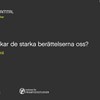snarare
Completed: Can we change a discriminatory behavior that we are unaware of?
Can ethnic implicit bias affect how public officials at social security offices assess applications for income support and if so, can these attitudes be changed or controlled across time?

Globala katastrofer och existentiella risker. Intervju med Anders Sandberg
Kärnvapenkrig, pandemier, istider och robotar smartare än människan. Både naturen och vi själva kan försätta oss i situationer där mänskligt liv hotas på en större skala. Här intervjuas forskaren Ande

Hur mår demokratin? Intervju med filosofen Gustaf Arrhenius, VD för Institutet för Framtidsstudier
Det talas om hot mot demokratin, om misstro mot politiker, sjunkande valdeltagande, om klyftor mellan folket och den verkliga makten och om olika typer av korruption. Hur mår egentligen demokratin? På

Offentliga samtal: Hur påverkar de starka berättelserna oss?
I seminarieserien Offentliga samtal – forskare möter praktiker bjuder vi in två forskare som presenterar sina resultat kring ett aktuellt ämne, för att sedan möta praktiker i ett samtal inför publik.
Belief Revision for Growing Awareness
Mind 130(520), 2021 Abstract The Bayesian maxim for rational learning could be described asconservative changefrom one probabilistic belief orcredencefunction to another in response to new information. ). But can this conservative-change maxim be extended to revising one’s credences in response to entertaining propositions or concepts of which one was previously unaware? The economists,) make a proposal in this spirit. Philosophers have adopted effectively the same rule: revision in response to growing awareness should not affect the relative probabilities of propositions in one’s ‘old’ epistemic state. The rule is compelling, but only under the assumptions that its advocates introduce. It is not a general requirement of rationality, or so we argue. We provide informal counterexamples. And we show that, when awareness grows, the boundary between one’s ‘old’ and ‘new’ epistemic commitments is blurred. Accordingly, there is no general notion of conservative change in this setting.

Moa Bursell
I am a researcher in sociology and research leader at the Institute for Futures Studies. I am also teaching at the Department of Sociology, Stockholm University. I received my doctorate at Stockholm U
Completed: Individual and collective responsibility for discrimination from implicit bias
The project aims to evaluate the ethical consequences, on an individual and collective level, of implicit bias that causes ethnic discrimination.
Completed projects
Completed projects since 2015. Agenta Algorithms in public decision-making Anxieties of democracy Can AI in job recruitment enhance the inclusion of disadvantaged groups? Can we change a discriminatory beh
We are all prejudiced. You and me both
At the Institute for Futures Studies, we treat discrimination as an import issue for the future. We are studying how it manifests itself, but we are also trying to understand how and why discriminatio








